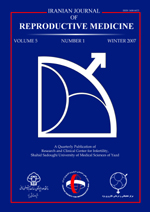
|
International Journal of Reproductive BioMedicine
Research and Clinical Center for Infertility, Shahid Sadoughi University of Medical Sciences of Yazd
ISSN: 1680-6433
EISSN: 1680-6433
Vol. 19, No. 1, 2021, pp. 75-86
|
 Bioline Code: rm21008
Bioline Code: rm21008
Full paper language: English
Document type: Research Article
Document available free of charge
|
|
|
International Journal of Reproductive BioMedicine, Vol. 19, No. 1, 2021, pp. 75-86
| en |
Culture density of menstrual blood-derived stromal/stem cells determines the quality of T cell responses: An experimental study
Nikoo, Shohreh; Ebtekar, Massoumeh; Jeddi-Tehrani, Mahmood; Bozorgmehr, Mahmood & Zarnani, Amir-Hassan
Abstract
Background: Menstrual blood-derived stromal/stem cells (MenSCs) are a new
population of refreshing and highly proliferative stem cells. Immunomodulatory effects
of MenSCs profoundly depend on their relative density.
Objective: To find whether MenSCs cultured at varying numbers would differentially
affect the allogenic peripheral blood mononuclear cells (PBMCs) key features.
Materials and Methods: PBMCs were co-cultured with various MenSCs numbers. PBMCs proliferation was investigated via 3H-thymidine incorporation. Flow cytometry
was used to assess human leukocyte antigen (HLA)-DR, HLA-ABC, HLA-G, and costimulatory
markers on MenSCs and the percentage of regulatory T cells (Tregs) among
PBMCs. The concentration of cytokines was determined in supernatant of co-cultures.
Results: The support of PBMCs proliferation at low MenSCs densities correlated
with higher levels of pro-inflammatory interferon gamma (IFN-γ) in MenSCs/PBMCs
co-culture and increased expression of HLA-DR by MenSCs. On the other hand,
the suppressive property of MenSCs at higher densities was independent of Treg
frequency, but correlated with a high concentration of Interleukin (IL)-6 and IL-10 in
the co-cultures.
Conclusion: Totally, at different seeding densities, MenSCs could differentially interact
with PBMCs leading to significant changes in the level of anti- and/or pro-inflammatory
factors. These preliminary in vitro results are suggested to be taken into consideration
in experimental models of MenSC-based immunomodulation. Nonetheless, for efficient
utilization of MenSCs anti-inflammatory features in pre-clinical disease models, we still
need to broaden our knowledge on MenSC-immune system cross-talk; this could play
a part in designing more optimized MenSCs injection modalities in the case of future
pre-clinical and subsequently clinical settings.
Keywords
Menstrual; Stromal cells; T cell response; Interferon-𝛾; Regulatory T cells; Cytokines.
|
| |
© Copyright 2021 - International Journal of Reproductive BioMedicine
Alternative site location: http://www.ijrm.ir
|
|
